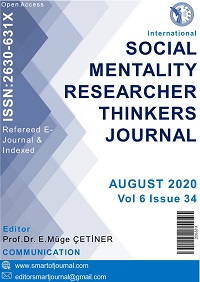Author :
Abstract
Geride bıraktığımız yüzyıl içinde bilim tarihinde üç büyük devrim gerçekleşmiştir: Görelilik kuramı, kuantum mekaniği, kaos ve belirsizlik kuramı. Kaos ve belirsizlik kuramı, kuantum mekaniği ile klasik mekanik arasında bir bağlantı oluşturmuştur. Kuantum mekaniğinin “her şeyin birbirleriyle ilişki halinde olduğu ve ilişkilerin sürekli değiştiği, değişimin ise belirsizliği doğurduğu” anlayışı ise, doğayı anlamak ve açıklamakla ilgili radikal ölçüde farklı bir yaklaşımın doğmasına neden olmuştur. Diğer yanda genellikle liderlik ile fizik arasındaki bağlantıyı kurmakta zorlanılmaktadır. Oysa fizik, dünyanın nasıl çalıştığını tanımlayan enerji, madde ve hareket durumlarını açıklarken benzer bir yolla liderlik de insan enerjisini harekete geçiren ve eyleme dönüştüren bir güçtür. Bu kavramsal temellerden yola çıkan çalışmanın amacı kuantum paradigması ile kuantum liderlik arasındaki ilişkiyi ortaya koymaktır. Çalışmanın sonunda, kuantum liderliğin mutlak anlamda en iyi liderlik türü olarak düşünülmemesi gerektiği, insan çabalarını kolaylaştırmak için teorik olarak mevcut olan bir dizi alternatiften biri olduğu ve özellikle kaos teorisi ile karmaşıklıktan gelen içgörülere, metaforlara dayandığından yüksek karmaşıklık, çok akış ve büyük belirsizliğin olduğu durumlar için uygun olduğu; yüksek kararlılık, düzen ve öngörülebilirliğin olduğu durumlar için uygun olmadığı ileri sürülmüştür.
Keywords
Abstract
In the century we left behind, there were three major revolutions in the history of science: the theory of relativity, quantum mechanics, chaos and the uncertainty theory. The theory of uncertainty and chaos enable to connect with quantum mechanics and classical mechanics. The perception of quantum mechanics that “everything is related to each other and relationships are constantly changing, and change is causing uncertainty” has led to a radically different approach to understanding and explaining nature. On the other hand, it is often difficult to establish the link between leadership and physics. However, while physics explains the states of energy, matter and motion that define how the world works, leadership in a similar way is a force that activates and transforms human energy into action. The purpose of the study, which sets off from these conceptual foundations, is to reveal the relationship between the quantum paradigm and quantum leadership. At the end of the study, quantum leadership should not be considered as the absolute best leadership type, it is one of a series of alternatives that are theoretically available to facilitate human efforts and especially is based on insights, metaphors from chaos theory and complexity, it is appropriate for situations where there is high complexity, high flow and great uncertainty, it has been suggested that it is not suitable for situations with high stability, order and predictability.
Keywords
- Capra, F. (1996). Yaşamın Örgüsü. (Çev.: Beno Kuryel), Yapı Merkezi Yayınları, İstanbul.
- Capra, F. (1996). Yaşamın Örgüsü. (Çev.: Beno Kuryel), Yapı Merkezi Yayınları, İstanbul.Carrol, P.J. (1998). “Parlak Bir Gelecek”. Executive Excellence, 2 (21).
- Covey, S. R. (1998). Etkili İnsanların 7 Alışkanlığı. (Çev.: Gönül Suveren), 7. b., Varlık Yayınları, İstanbul.
- Cüceloğlu, D. (1998). İyi Düşün Doğru Karar Ver. 23. b., Sistem Yayıncılık, İstanbul.
- Dargahi, H. (2013). “Quantum Leadership: The Implication for Iranian Nursing Leaders”. Acta Medica Iranica, 51 (6), 411-417.
- Erçetin, Ş.Ş., (2000). Lider Sarmalında Vizyon. 2. b., Nobel Yayın Dağıtım, Ankara.
- Erçetin, Ş.Ş., Çevik, M.S. & Çelik, M. (2018). “Okul Müdürlerinin Kuantum LiderlikDavranışlarını Gerçekleştirme Düzeyleri”. Uluslararası Liderlik Çalışmaları Dergisi Dergisi: Kuram ve Uygulama, 1 (2), 109-124.
- Erkutlu, H.V. (2014). Liderlik, Kuramlar ve Yeni Bakış Açıları. Efil Yayınevi, Ankara.
- Fris, J., & Lazaridou, A. (2006). “An Additional Way of Thinking About Organizational Life andLeadership: The Quantum Perspective”. Canadian Journal of Educational Administration and Policy, Canadian Journal of Educational Administration and Policy, 48, 1-29.
- Hanine, S. & Nita, M.A. (2019). “The paradigm of quantum leadership : ontology, praxis and application to management”. Revue Internationale des Sciences de Gestion, 3, 837-858.
- Koçak, R.D. (2020). “A Perspective to 21st Century Management: Quantum Leadership”. AcademicStudies in Social Sciences, (Ed. Hasan Babacan, Meriç Eraslan, Abidin Temizer), Ivpe Cetinje, Montenegro, 318-337.
- Kuhn, T.S. (1995). Bilimsel Devrimlerin Yapısı. (Çev.: Nilüfer Kuyaş), 4. b., Alan Yayıncılık,Lazaridou, A. & Fris, J. “Slipping the Yoke of the Heroic Paradigm: Looking for Quantum Leadership”. https://files.eric.ed.gov/fulltext/EJ940819.pdf, (26.07.2020).
- Omnés, R. (2018). Kuantum Felsefesi. (Çev.: Ercüment Akat), 2. b., Alfa Yayınları, İstanbul.
- Papatya, G. & Dulupçu, M.E. “Thinking Quantum Leadership for True Transformation: TheTalisman of ‘not to know’ at the Threshold of New Leadership”.https://pdfs.semanticscholar.org/26f5/baf60daa23f98ec30d76218d9bc577279f35.pdf, (26.07.2020)
- Prigogine, I. & Stengers, I. (1998). Kaostan Düzene. (Çev.: Senai Demirci), 2. b., İz Yayıncılık, İstanbul içinde Alvin Toffler, Takdim: Bilim ve Değişme.
- Samur, M. & Seren İntepeler, Ş. (2016). “Karmaşıklık Bilimi Işığında Hemşireliğin Değişimi:Kuantum Teorisi ve Kompleks Adaptif Sistemler”. Dokuz Eylül Üniversitesi Hemşirelik Fakültesi Elektronik Dergisi, 9 (3), 105-111.
- Şanal, M. (2020). “Yönetimde Sinerji için Kuantum Bakış Açısı”. Avrasya Sosyal ve Ekonomi Araştırmaları Dergisi (ASEAD), 7 (1), 42-50.
- Şenyılmaz, A. (2012). “Yönetimde Kuantum Yaklaşımı, Organizasyonel Enerjinin Ölçümü için Bir Model”. İTÜ Fen Bilimleri Enstitüsü Doktora tezi.
- Şimşek, H. (1997). Paradigmalar Savaşı-Kaostaki Türkiye. Sistem Yayıncılık, İstanbul.
- Rifkin, J. & Howard, T. (1997). Entropi. (Çev.: Hakan Onay), 2. b., İz Yayıncılık, İstanbul.
- Turan, S. (2017). “Okul Yöneticilerinin Kuantum Liderlik Davranışlarının Örgütsel Zekâ Düzeyine Etkisi (Zonguldak İli Örneği)”. Hacettepe Üniversitesi Doktora tezi, Ankara.
- Woods, A. & Grant, T. (2011). Aklın İsyanı. (Çev.: Ömer Gemici), Ufuk Demirsoy, Tarih Bilinci Yayınları, İstanbul.
- Yıldırım, C. (1998). Bilim Felsefesi. 6. b., Remzi Kitabevi, İstanbul.Yıldırım, C. (1999). Bilim Tarihi. 6. b., Remzi Kitabevi, İstanbul.
- Zohar, D. (2018). 21. Yüzyılda Liderlik. (Çev.: İlke Haydaroğlu), The Kitap Yayınları, İstanbul.





